If you’ve ever wondered whether taking excessive amounts of vitamins could harm your kidneys, you’re not alone! In this article, we’ll explore the intriguing question of whether or not too many vitamins can have a detrimental effect on your kidneys’ health. Vitamins are essential for our overall well-being, but could there be such a thing as too much of a good thing? Let’s dive into the fascinating world of vitamins and their impact on our kidneys to find out!

Understanding Vitamins and Their Importance
The role of vitamins in the body
Vitamins play a crucial role in maintaining overall health and well-being. These organic compounds are essential for the proper functioning of various bodily systems. They act as coenzymes, which means they assist enzymes in carrying out vital chemical reactions in the body. From aiding in the release of energy from food to supporting the immune system, vitamins are involved in numerous processes necessary for our survival.
Different types of vitamins and their functions
There are 13 essential vitamins, each with its own unique function. These can be classified into two categories: water-soluble vitamins and fat-soluble vitamins.
Water-soluble vitamins, including the B-vitamins (such as thiamin, riboflavin, niacin, and folate) and vitamin C, are not stored in the body and need to be replenished regularly. They play a crucial role in producing energy, maintaining healthy skin, and forming red blood cells, among other functions.
Fat-soluble vitamins, such as vitamins A, D, E, and K, are stored in the body’s fat tissues and liver. Their absorption requires the presence of dietary fat. These vitamins are important for various functions, such as supporting vision, bone health, and blood clotting.
Recommended daily allowances for vitamins
The recommended daily allowances (RDAs) for vitamins vary depending on factors such as age, gender, and specific health conditions. These guidelines are established by government health agencies and provide an estimate of the amount of each vitamin needed to meet the nutritional requirements of most individuals in a specific population.
It is important to note that the RDAs are set as a general guideline and may not be suitable for everyone. Individual needs may vary, and it is always recommended to consult with a healthcare professional to determine the appropriate vitamin intake based on your specific circumstances.
Benefits of getting vitamins from natural food sources
While vitamin supplements can be useful in certain situations, it is generally recommended to obtain essential vitamins from natural food sources. Whole foods provide a wide range of nutrients, including vitamins, minerals, fiber, and phytochemicals, which work together synergistically to support overall health.
When vitamins are obtained from natural food sources, they are often accompanied by other beneficial compounds that can enhance their absorption and utilization in the body. Additionally, whole foods provide a balanced and diverse nutrient profile, whereas supplements may only provide isolated vitamins, lacking the synergistic effects found in food.
Choosing nutrient-rich foods such as fruits, vegetables, whole grains, lean proteins, and healthy fats can help ensure a well-rounded intake of vitamins and other essential nutrients.
Kidney Function and Importance
An overview of the kidneys and their functions
The kidneys are vital organs located on either side of the spine, just below the ribcage. Their main function is to filter waste products, excess water, and toxins from the blood, helping to maintain a stable balance of fluids and electrolytes in the body. The kidneys also play a crucial role in regulating blood pressure, producing red blood cells, activating vitamin D, and maintaining acid-base balance.
The role of kidneys in maintaining overall health
Healthy kidneys are crucial for maintaining overall health and well-being. By filtering the blood and removing waste products, the kidneys help prevent the buildup of toxins and maintain a clean internal environment. They also help regulate blood pressure by controlling the balance of sodium, potassium, and water in the body. Moreover, the kidneys play a vital role in the production of red blood cells, which are responsible for carrying oxygen throughout the body.
Common kidney-related health issues
Various health issues can affect the kidneys, impairing their ability to function properly. Some common kidney-related conditions include kidney stones, urinary tract infections, chronic kidney disease, and acute kidney injury. These conditions can cause symptoms such as pain, changes in urine color or frequency, fatigue, and fluid retention. It is important to seek medical attention if you experience any persistent kidney-related symptoms to prevent further complications.

Potential Effects of Excessive Vitamin Consumption
Understanding vitamin toxicity
While consuming an adequate amount of vitamins is essential for good health, excessive intake can lead to vitamin toxicity. Vitamin toxicity occurs when the body accumulates high levels of vitamins beyond what it can effectively utilize or eliminate. This can lead to adverse effects on various bodily systems, including the kidneys.
Negative impacts of excessive vitamins on the body
Excessive vitamin consumption can cause a range of negative effects on the body. For instance, too much vitamin A can lead to nausea, dizziness, joint pain, and even hair loss. High doses of vitamin C may cause digestive disturbances, such as diarrhea and stomach cramps. Likewise, excessive intake of vitamin D can lead to elevated levels of calcium in the blood, resulting in kidney stones or kidney damage.
Signs and symptoms of vitamin toxicity
Recognizing the signs and symptoms of vitamin toxicity is crucial to prevent any potential harm. These symptoms can vary depending on the specific vitamin and the severity of the toxicity. Common signs may include nausea, vomiting, fatigue, headaches, and changes in urine color or frequency. If you suspect vitamin toxicity, it is important to consult with a healthcare professional for proper evaluation and guidance.
How excessive vitamins can affect the kidneys
The kidneys play a vital role in filtering and eliminating various substances, including vitamins. When the body is exposed to excessive amounts of certain vitamins, such as vitamins A and D, the kidneys can become overwhelmed and struggle to excrete them efficiently. This can lead to the accumulation of these vitamins in the body, potentially causing harm to the kidneys themselves.
It is worth noting that excessive vitamin consumption alone may not be the sole cause of kidney damage. However, when combined with other factors such as pre-existing kidney disease, dehydration, or certain medications, excessive vitamins can exacerbate kidney damage and compromise their function.
Water-Soluble Vitamins and Kidney Health
Overview of water-soluble vitamins
Water-soluble vitamins, including the B-vitamins and vitamin C, are essential nutrients that play a crucial role in various bodily functions. Unlike fat-soluble vitamins, water-soluble vitamins are not stored in the body, which means they need to be replenished regularly through diet or supplementation.
The relationship between water-soluble vitamins and kidneys
The kidneys play a vital role in the metabolism and elimination of water-soluble vitamins. They help filter these vitamins from the bloodstream and excrete any excess through urine. Because water-soluble vitamins are not significantly stored in the body, it is generally considered safe to consume them in higher quantities than fat-soluble vitamins. However, excessive intake of certain water-soluble vitamins can still pose risks to kidney health.
Specific water-soluble vitamins that can potentially harm the kidneys
High doses of certain water-soluble vitamins can potentially harm the kidneys, especially in individuals with pre-existing kidney conditions. For example, excessive vitamin C intake may increase the risk of kidney stone formation, particularly in people prone to kidney stones. Likewise, high levels of vitamin B6 can cause sensory neuropathy, a condition characterized by nerve damage that can affect kidney function.

Fat-Soluble Vitamins and Kidney Health
Overview of fat-soluble vitamins
Fat-soluble vitamins, including vitamins A, D, E, and K, are essential for various bodily functions. Unlike water-soluble vitamins, fat-soluble vitamins can be stored in the body, primarily in adipose tissue and the liver. This storage capability allows the body to rely on these vitamins during times of limited dietary intake.
The relationship between fat-soluble vitamins and kidneys
The kidneys are responsible for filtering and excreting waste products, including fat-soluble vitamins. However, because these vitamins are stored in the body, excessive intake can increase the risk of renal damage and kidney stone formation. Moreover, impaired kidney function can affect the proper metabolism and utilization of fat-soluble vitamins, leading to deficiencies or toxicities.
Specific fat-soluble vitamins that can potentially harm the kidneys
Among the fat-soluble vitamins, excessive intake of vitamins A and D has been associated with potential kidney damage. High levels of vitamin A can increase the risk of kidney stone formation, while excessive vitamin D intake can lead to hypercalcemia, a condition characterized by elevated levels of calcium in the blood. Both of these conditions can put strain on the kidneys and compromise their function.
Effects of High-Dose Vitamin Supplements on Kidney Function
The impact of high-dose vitamin supplements on kidney function
High-dose vitamin supplements, especially when consumed without medical supervision, can have a significant impact on kidney function and overall health. The kidneys are responsible for processing and eliminating excess vitamins from the body, but when faced with excessive doses, they can be overwhelmed and struggle to maintain proper function.
Research findings on the effects of excessive vitamins on the kidneys
While research on the effects of high-dose vitamin supplements on kidney function is still ongoing, some studies have suggested potential risks. Excessive vitamin intake, particularly in the form of supplements, has been associated with an increased risk of kidney stones, impaired kidney function, and even kidney failure. However, more research is needed to fully understand the extent of these associations and the underlying mechanisms.
Potential risks and complications
Taking high-dose vitamin supplements without proper medical guidance can lead to various risks and complications, including kidney damage. Excessive vitamin intake can disrupt the delicate balance of nutrients in the body and potentially interfere with the normal functioning of the kidneys. It is important to exercise caution when considering vitamin supplementation and to discuss the appropriateness of high doses with a healthcare professional.

Prevention and Management of Kidney Damage
Preventing kidney damage caused by excessive vitamins
Preventing kidney damage caused by excessive vitamin intake requires a balanced approach to nutrition and supplementation. It is important to prioritize obtaining vitamins from natural food sources whenever possible, as they provide a wide range of nutrients and are generally more easily absorbed by the body. When considering vitamin supplementation, it is crucial to consult with a healthcare professional who can provide personalized advice based on your specific needs and health status.
Balancing vitamin intake through a well-rounded diet
Maintaining a well-rounded diet that includes a variety of nutrient-rich foods is crucial for obtaining vitamins and other essential nutrients. Focus on consuming fresh fruits, vegetables, whole grains, lean proteins, and healthy fats, as these foods provide a diverse range of vitamins, minerals, and other beneficial compounds. By prioritizing a balanced diet, you can help ensure an appropriate intake of vitamins while minimizing the risk of excessive consumption.
Supplement guidelines and recommendations
When considering vitamin supplementation, it is important to follow the recommended guidelines and dosage instructions provided by reputable manufacturers. Avoid exceeding the recommended daily doses unless specifically advised by a healthcare professional. Additionally, be aware of potential interactions between supplements and medications, as certain combinations can have adverse effects on kidney health. Always consult with a healthcare professional before starting any new supplement regimen.
Monitoring kidney health through regular check-ups
Regular check-ups with a healthcare professional are essential for monitoring kidney health and identifying any potential issues. Routine blood and urine tests can help assess kidney function and detect early signs of kidney damage or imbalance. By staying proactive with your health, you can address any concerns or abnormalities in a timely manner and take appropriate measures to protect your kidneys from further harm.
Special Considerations for Individuals with Kidney Disease
Understanding kidney disease and its impact on the body
Kidney disease is a condition in which the kidneys are unable to function properly, leading to a buildup of waste products and fluids in the body. Chronic kidney disease (CKD) is a progressive condition that can result from various factors, including diabetes, high blood pressure, and certain genetic disorders. Kidney disease significantly affects overall health and requires special considerations when it comes to vitamin intake.
Restrictions and recommendations for vitamin intake in kidney disease patients
Individuals with kidney disease often have specific dietary restrictions and recommendations to help manage their condition. Depending on the stage of kidney disease, the intake of certain vitamins may need to be monitored or adjusted to prevent further kidney damage. Common restrictions include limiting sodium, phosphorus, and potassium intake, as well as being cautious with water-soluble vitamin supplements, such as vitamin C.
Potential interactions between medications and vitamins
It is important for individuals with kidney disease to be aware of potential interactions between medications and vitamins. Some medications commonly prescribed for kidney disease can impact the metabolism and utilization of certain vitamins, leading to deficiencies or toxicities. To minimize these risks, healthcare professionals must carefully monitor medication regimens and provide recommendations for appropriate supplementation based on individual needs.

The Importance of Consulting a Healthcare Professional
When to seek advice from a healthcare professional
Seeking advice from a healthcare professional is crucial when it comes to managing vitamin intake and protecting kidney health. If you have any concerns about your vitamin consumption, especially if you are considering high-dose vitamin supplements or have pre-existing kidney conditions, it is important to consult with a healthcare professional. They can evaluate your individual health status, provide personalized recommendations, and monitor any potential risks or complications.
The role of doctors and specialists in managing vitamin intake
Doctors and specialists play a vital role in managing vitamin intake and kidney health. They have the knowledge and expertise to evaluate your overall health, assess the potential risks and benefits of vitamin supplementation, and provide guidance on appropriate doses and formulations. By working closely with a healthcare professional, you can ensure that your vitamin intake aligns with your specific needs and health goals.
Tailoring vitamin supplementation based on individual needs
Every individual has unique nutritional needs, especially when it comes to vitamins and kidney health. It is important to recognize that one size does not fit all when it comes to vitamin supplementation. A healthcare professional can help tailor your vitamin regimen based on factors such as age, gender, health conditions, and any medications you may be taking. By addressing your individual needs, you can optimize your vitamin intake while minimizing the risk of potential harm to your kidneys.
Conclusion
Maintaining a balanced approach to vitamin intake is essential for overall health and well-being, including the health of your kidneys. While vitamins are necessary for proper bodily function, excessive consumption can potentially harm the kidneys and compromise their function. It is important to prioritize obtaining vitamins from natural food sources and to consult with a healthcare professional for personalized advice on supplementation. By maintaining proper nutrition, monitoring kidney health, and seeking professional guidance, you can promote kidney health and minimize the risks associated with excessive vitamin consumption. Prioritizing the well-being of your kidneys is an investment in your overall health.

